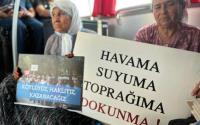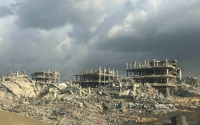Common Dreams / Published on Tuesday, July 25, 2006 by the Los Angeles TimesMegan K. Stack
In the burning haze of the missile strike, Qasim Chaalan thought he had died. But piece by piece, he noticed that he was still there, inside the ambulance. He could still feel his body. He opened his eyes, and discovered he could see.
He and the other medics were lucky: They had survived the blow of an Israeli missile. Dazed and slow, one of the men fumbled for the radio and began, "We have an accident…. " He didn't finish the sentence. A second missile smashed with a roar into the ambulance behind them.
Six Red Cross volunteers were wounded in the Sunday attack, and the injured family they were ferrying to safety suffered fresh agonies. A middle-age man lost his leg from the knee down. His mother was partially paralyzed. A little boy's head was hammered by shrapnel.
Perhaps most dangerous of all, the attack blunted the zeal of the band of gonzo ambulance drivers who have doggedly plugged away as Red Cross volunteers. Young men and women with easy grins and a breezy disregard for their own safety, they have remained as the last visible strand of social structure intact after days of Israeli bombardment.
When the fighting erupted between Israel and Hezbollah, many of the volunteers sent their families north and stayed behind to help their countrymen. Clad in helmets and flak jackets, they brave a rain of Israeli bombs, a crazy maze of cratered roads and perpetual uncertainty over how bad the fighting might become. Fiercely proud of their work at the Red Cross, they had clung desperately to the hope that, as lifesavers, they would be spared.
Many times over nearly two weeks of bombing, medics say, missiles struck the roads nearby; they felt harassed. But somehow, they managed to convince themselves that they were invulnerable to attack.
"We used to kid ourselves, think we couldn't be hit," 38-year-old volunteer Imad Hillal said. "Even in this war, even when bombs fell around us, we never thought we'd be hit. But what happened has changed everything."
Sitting in the radio room at Red Cross headquarters here Monday, Hillal rested his head wearily on one hand. When asked whether the ambulances would continue running, tears clouded his eyes.
The Red Cross team had been sent out into a night that thundered with falling bombs. They'd been assigned to ferry three wounded civilians out of the heaviest battle zone of the southern borderlands on Sunday. One team of medics had headed north from the town of Tibnin, the wounded family stretched flat on gurneys in the back. The other team had rushed south from Tyre to meet them halfway.
From the time the call came in, Chaalan hadn't been able to shake his dread. He didn't understand why. He had made the trip plenty of times before.
As he made his way out to the ambulance, he turned to the other medics loitering around and, surprising even himself, used a traditional Arabic farewell that implies death may be near.
"I'll see you, forgive me," he told them. He'd never said that before. One of his colleagues followed him out the door. "Please take care," she said. She'd never done that before; it made him even more nervous. He brushed her off and climbed into the ambulance.
The three young men drove out to the town of Qana. Looking up, they could see red lights in the sky overhead. Israeli planes, Chaalan thought.
They came to a stop on a stretch of battle-pocked roadway in Qana.
The medics favor that spot because the ambulances, with their trademark red crosses emblazoned on the roofs, can be seen clearly from above. They thought it was safe.
They climbed down, removed the patients from the other ambulance and slid them into place. They moved fast; everybody was nervous.
Then the roar and smash of the missiles shattered the summer night. Both ambulances were hit, directly and systematically, by Israeli bombs, the medics said.
Everybody else must be dead, Chaalan remembered thinking as he slowly came to his senses. He called out his first medic's name, and got an answer. He called out the second man's name. Silence. "We lost one man," he thought.
The grandmother had crawled out of the ambulance after the first missile strike, but the medics didn't realize that. There was no way the adults could have survived, the medics decided.
So they grabbed the little boy and took shelter in a nearby basement.
Most of the houses on the street stood empty, abandoned by families who'd heeded Israeli evacuation orders and fled north. More bombings continued to puncture the night.
Huddled in the darkness of the basement, they ran their hands over their own bodies, checking for injuries. The boy's head, full of shrapnel, was bleeding badly. They used T-shirts to bandage his wounds.
Then they waited in the darkness. They managed to get through to the Red Cross station from their cellphones. An hour and a half dragged past.
Finally, Hillal and the other medics made it to the scene. "It was a disaster," he said.
"The cars had exploded all over the place. There was one man so badly injured we didn't know what to do for him."
At first, the Red Cross had considered whether to stop making ambulance runs altogether, he said. Then the organization thought better of it and recommended that the teams only stop driving south. Hillal didn't know what would happen. He only knew that the ground rules had been blasted away — the medics had been stripped of their sense of safety.
"When we were driving in the ambulance before, we did not feel we are safe 100%," Chaalan said. "But now it's direct on us."
On Monday, medics and the wounded family were all in the hospital. The grandmother lay on her side in a hospital bed, face turned to the sky outside her window.
"Give me something for the pain," she groaned. "I'm going to vomit." A son and grandson were unconscious in the intensive care unit. Her son, whose leg had been struck by the missile, lay under a tangle of tubes. The sheet reached just below the knee. His calf wasn't there anymore.
Chaalan was bleeding from the ear, and stitches bound his chin and a leg. He needed a few more days to recover, but he insisted on going home.
He peeled off his bandages before stopping by to kiss his mother.
And then he was back at the Red Cross station, padding around in a Las Vegas T-shirt, insisting that he was ready to get back to work.
"I prefer to die when I'm helping people," he said. "Not when I'm hiding."






